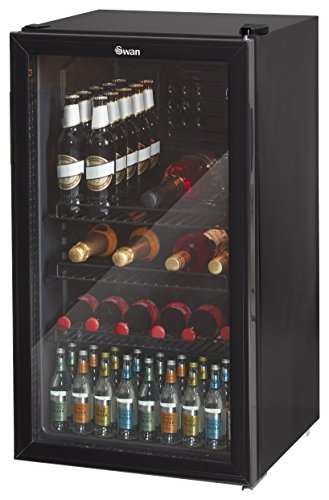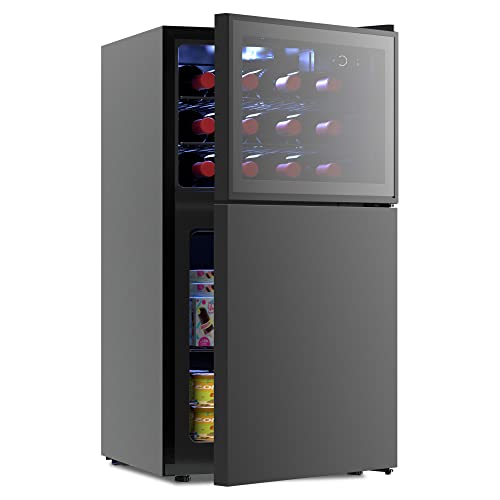Five Killer Quora Answers On Beer And Wine Refrigerator
페이지 정보
작성자 … 작성일 24-09-01 15:26 조회 4 댓글 0본문
 Choosing a Beverage and Wine Refrigerator
Choosing a Beverage and Wine RefrigeratorWhen you're hosting guests, or just enjoying a relaxing glass of wine with dinner the dual-zone fridge is the ideal way to keep and chill both wine and beers. It can be a freestanding unit or built-in, and features an aesthetically seamless door that fits in any space.
While vibrations are generally harmless, they can disturb the sediment in a bottle and trigger chemical reactions that may not be visible. Over time, this can reduce esters and dull flavors.
Control of Humidity
Humidity refers to the amount of water vapor that is present in the air. It fluctuates throughout the day because of many factors. Temperature, precipitation, wind and other environmental conditions can significantly affect humidity levels. It is essential to keep humidity at an optimal level for a variety of reasons. The humidity affects the weather patterns and indoor air, as well as wine storage. The delicate composition of a wine is made up of numerous aromatic compounds that are sensitive to changes in humidity. When humidity is too high, it may affect the balance of these compounds and alter the taste of a wine refrigerator best. A wine refrigerator can help maintain the right humidity level to preserve the wine's flavor.
A wine refrigerator can prevent cork deterioration and ensure an adequate seal. If the humidity is low, corks can dry out and allow oxygen into the bottle, which can accelerate the aging process and tainting the wine's taste. A wine refrigerator can be used to maintain a level of humidity between 55% and 75%.
While wine cellars are designed for aging over time, wine coolers can also provide excellent storing conditions for beer and wines. A lot of these units contain a space specifically for beer bottles, meaning you can easily store your favorite craft beers and lagers in the same location as your favorite wines. They also have effective designs that balance the humidity and temperature to avoid condensation that could harm labels or packaging.
The majority of models come with the hygrometer, which lets you monitor and adjust humidity levels in your wine cooler. You can also use a humidifier to increase the humidity inside your large wine fridge fridge.
If you opt to use a wine refrigerator, place the dehumidifier in a space apart from it. This will stop the dehumidifier from absorbing any of the beer or wine that you store in the refrigerator. Controlling humidity is especially important if you plan to store your wine for long periods of time. In a short period of time, you may not notice any changes in your wine, however over months or years the absence of humidity can significantly alter the taste of your favorite wines.
Vibration Absorption
The vibrations in the wine and drinks fridge fridge can hinder the natural aging of the stored wines. Even small vibrations can trigger disturbance in the sediment inside the bottle, which triggers intricate chemical reactions that reduce esters and dull the wine's flavor with time. All La Sommeliere units have a vibration absorption system that minimizes the sound and tremors and allows your wine to age quietly and properly.
Aside from the fact that wine coolers typically emit less sound than normal refrigerators, they are predisposed to noise issues due to the system of fans and refrigerant circuits that are found in the majority of units. It is essential to follow the clearance guidelines and place your wine cooler in a quiet location away from any other sources of noise.
Furthermore, it is recommended to periodically clean your wine cooler with an anti-abrasive cleaner and allow the unit to "air out" before loading it with bottles. This will help reduce the amount of dirt and dust that could build up in the air vents.
If you notice that your wine fridge is making excessive noises, it could be caused by a malfunctioning compressor or electric fan. The compressor is usually located behind the wine refrigerator. If it is placed in an unbalanced position or bumps into something behind it, it may shake itself loose from its rubber mounts, which can cause loud humming noises.
The compressor wine cooler functions like a standard fridge by compressing air molecules electronically, which reduces their temperature. They are then blown through the interior of your refrigerator. This kind of cooling is more energy-efficient than other cooling methods like evaporator or frost-free refrigerators. The downside to compressor wine coolers is that they require frequent repairs and tend to generate more noise than other types of refrigerators. Because of this, many consumers choose to purchase thermoelectric wine coolers which don't make use of a compressor system.
Temperature Control
Beer, like wine, has specific temperature requirements to ensure its flavor is maintained. This is why it's crucial to select the right wine fridge and beverage refrigerator that offers adjustable temperature controls to ensure that you keep your drinks at the perfect temperature for storage and serving for each type. You can also find dual zone models that offer separate temperature zones for wine bottles, and a separate temperature zone for beer or other beverages.
Generally speaking, the majority of beer types prefer to be served colder than wine. However, the ideal serving temperature for a particular style is determined by its type and how it's made. For example, wheat beers and pilsners should be enjoyed between 40 and 50 degrees Fahrenheit while sours, IPAs barleywines, and more robust ales should be served between 50 to 55 degrees Fahrenheit. Warming a beer too long will create an unpleasant "skunk" smell that can detract from the overall drinking experience.
When it is about wine, it is important to pick a wine refrigerator that has the right temperature range to accommodate your favorite reds, whites, and sparkling wines. Some wine refrigerators come with humidification features that prevent the cork from becoming oxidized and keep it in good shape. Some models even have specialized UV glass to block sunlight, which helps preserve the wine's color and shield it from premature ageing.
The temperature control system in a refrigerator is powered by thermoelectric cooling or compressor technology. Compressors use vapor compressors to reduce temperatures in the wine refrigerator, whereas thermoelectric models utilize electronic convection fans to circulate cool air through the refrigerator. For the best results, many refrigerators use both of these two technologies.
If you are planning to purchase a wine fridge or beverage refrigerator that utilizes compressor technology, you should look for one with shockpads that are vibration-resistant. The vibrations caused by compressor-related operations can interfere with the process of maturation of wine and can accelerate oxidation.
While you can buy a fridge that's designed specifically for wine, you may find it more cost-effective to buy a conventional refrigerator, or even a standard refrigerator with a large wine refrigerator interior with movable shelves and ample storage on the doors. You can then modify the space to fit a wide variety of wine, beer, as well as other bottles and cans.
Storage Options
Consider a beverage cooler If you love hosting parties. These fridges store cans and bottles of wine and beer along with other beverages that are ice cold like soda and water. These fridges are available as both freestanding and built-in models. Built-in models can be incorporated into cabinets or under counters in kitchens with small space.
The two types of refrigerators are available in a broad variety of sizes and designs, making them suitable for most homes. Find models with sliding shelves that make it easier to locate your preferred beverages and wines. Some refrigerators feature soft LED lighting that reveals your wine collection in a soft light. Some refrigerators also come with a humidity control feature. This feature can stop the formation of frost in your beer and wine bottles, allowing you to enjoy them without worry.
Dual-zone refrigerators can keep your wine at the optimal temperature for serving. You can also use the separate zones to keep your craft beer in storage as it usually has similar ideal temperature ranges to a wine bottle. A dual zone beer and wine refrigerator can also accommodate larger bottles of spirits or beer than a standard fridge.
Keep your beer and wine in an area with adequate light protection. The right conditions will extend their life. The refrigerator should also be kept free of odors, dust and other debris that can impact the flavor of your beverages over time.
Consider a cellar fridge if you want to store an extensive collection and preserve its worth. This kind of refrigerator is made to be used for long-term storage. It operates at a temperature that is slightly higher than a wine fridge, which lets your bottles age to their peak flavor. A cellar fridge also comes with a humidifier that maintains the right humidity level. This ensures that the cork stays moist and impermeable. It also prevents external air and food remnants from your refrigerator from getting into the bottle and deteriorating it over time.

- 이전글 Guide To 3 Wheeler Pushchairs: The Intermediate Guide In 3 Wheeler Pushchairs
- 다음글 When Should You Consider Replacing Your Front Door?
댓글목록 0
등록된 댓글이 없습니다.

